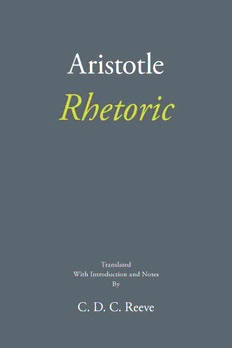
Rhetoric PDF
Preview Rhetoric
Aristotle Rhetoric Translated With Introduction and Notes By C. D. C. Reeve Aristotle Rhetoric DSHPC067-FM.indd 1 14/07/18 1:45 PM DSHPC067-FM.indd 2 14/07/18 1:45 PM Aristotle Rhetoric Translated With an Introduction and Notes By C. D. C. Reeve Hackett Publishing Company, Inc. Indianapolis/Cambridge DSHPC067-FM.indd 3 14/07/18 1:45 PM Copyright © 2018 by Hackett Publishing Company, Inc. All rights reserved Printed in the United States of America 21 20 19 18 1 2 3 4 5 6 7 For further information, please address Hackett Publishing Company, Inc. P.O. Box 44937 Indianapolis, Indiana 46244-0937 www.hackettpublishing.com Cover design Deborah Wilkes Interior design by Elizabeth L. Wilson Composition by Aptara, Inc. Library of Congress Cataloging-in-Publication Data Names: Aristotle, author. | Reeve, C. D. C., 1948– translator. Title: Rhetoric / translated with an introduction and notes by C.D.C. Reeve. Other titles: Rhetoric. English Description: Indianapolis ; Cambridge : Hackett Publishing Company, Inc., 2018. | Includes bibliographical references and index. Identifiers: LCCN 2018004944| ISBN 9781624667336 (pbk.) | ISBN 9781624667343 (cloth) Subjects: LCSH: Rhetoric—Early works to 1800. | Poetry—Early works to 1800. | Aesthetics—Early works to 1800. Classification: LCC PN173.A7 R6 2018 | DDC 808—dc23 LC record available at https://lccn.loc.gov/2018004944 Adobe PDF ebook ISBN: 978-1-62466-735-0 For Amélie Rorty & Jonathan Lear The question is not one of misrepresentation, but of adjusting fact, so as to raise it to the power of evidence. —George Eliot, Felix Holt, the Radical DSHPC067-FM.indd 5 14/07/18 1:45 PM DSHPC067-FM.indd 6 14/07/18 1:45 PM Contents Preface xi Abbreviations xiii Introduction xix Rhetoric Book I I 1 Rhetoric as the counterpart of dialectic; deficiencies in previous accounts; the importance of enthymemes and means of persuasion; what a craft of rhetoric should be; the definition of rhetoric. 2 I 2 Formal definition of rhetoric; means of persuasion that are inside and outside the province of rhetoric; persuasion through character, through listeners, and through argument; paradigm, enthymeme, apparent enthymeme; rhetoric’s province; likelihoods, signs, and proofs; enthymemes in accord with rhetoric vs. in accord with a definite science or craft; common and special topics. 5 I 3 The three kinds (eidos) of rhetoric: deliberative, judicial, and epideictic; rhetorical premises and the importance of possessing them. 11 I 4 Deliberative oratory I. 12 I 5 Deliberative oratory II: happiness; its definition; its components—good breeding, friends, wealth, children, a good old age, health, noble beauty, strength, stature, athletic capacity, reputation, honor, good fortune, virtue, good fortune and luck; their definitions. 15 I 6 Deliberative oratory III: advantage and goods. 18 vii DSHPC067-FM.indd 7 14/07/18 1:45 PM Contents I 7 Deliberative oratory IV: comparison of goods. 22 I 8 Deliberative oratory V: the importance of getting a grasp on all constitutions and distinguishing the characters, customs, and advantages of each; what these constitutions and their ends are. 27 I 9 Epideictic oratory: its targets—virtue and vice, noble and shameful; their definitions; amplification. 28 I 10 Judicial oratory I: (a) what things and how many of them people do injustice for the sake of; (b) in what way these people are disposed; (c) the sorts of people they do injustice to and their condition. 34 I 11 Judicial oratory II: (a) pleasure. 37 I 12 Judicial oratory III: (b–c). 41 I 13 Judicial oratory IV: just and unjust actions defined; in relation to the law (special or universal); in relation to the thing affected (individual, community); unwritten law; decency. 45 I 14 Judicial oratory V: greater and lesser injustice of actions. 48 I 15 Judicial oratory VI: means of persuasion that are outside the province of craft—laws, witnesses, contracts, results of torture, and oaths. 49 Book II II 1 Rhetoric is for the sake of judgment and so must look to the argument, the speaker and his character, and to the judge and his feelings. 55 II 2 Anger. 56 II 3 Mild-manneredness. 60 II 4 Friendliness and enmity. 63 II 5 Fear and confidence. 66 II 6 Shame and shamelessness. 69 II 7 Gratitude and ingratitude. 72 II 8 Pity. 73 viii DSHPC067-FM.indd 8 14/07/18 1:45 PM Contents II 9 Indignation. 75 II 10 Envy. 77 II 11 Jealousy. 79 II 12 People’s characters: feelings, states, stages of life, fortunes (luck); the character of young people. 80 II 13 The character of older people. 82 II 14 The character of those in their prime. 83 II 15 Goods due to luck: good breeding. 84 II 16 Wealth. 84 II 17 Capacity. 85 II 18 A backward and forward look; notions common to all kinds of speeches. 86 II 19 Possible and impossible; the past; the future; degree (amplifying and diminishing). 87 II 20 Means of persuasion common to all kinds of speeches: paradigm (of which maxim is a part) and enthymeme; the two kinds of paradigms. 89 II 21 Maxims. 91 II 22 Enthymemes. 95 II 23 Topics (T1–28) for enthymemes. 97 II 24 Topics (T1*–9*) for apparent enthymemes. 105 II 25 Refutation. 109 II 26 Amplifying and diminishing; refutative enthymemes. 111 Book III III 1 Style; delivery. 112 III 2 Virtues of style: perspicuousness, appropriateness; and elevating; exotic vs. prevalent names; metaphor; epithets; diminutives. 114 III 3 Frozen effects and how they come about in a style; inappropriate metaphors. 117 ix DSHPC067-FM.indd 9 14/07/18 1:45 PM
